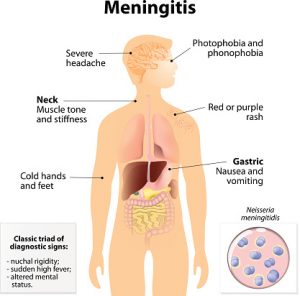 Meningitis is inflammation surrounding protective membranes of the spinal cord. Bacterial meningitis can be life-threatening, especially in aging adults. There are five types of meningitis, including bacterial, viral, fungal, parasitic and non-infectious.
Meningitis is inflammation surrounding protective membranes of the spinal cord. Bacterial meningitis can be life-threatening, especially in aging adults. There are five types of meningitis, including bacterial, viral, fungal, parasitic and non-infectious.
The severity of meningitis can differ and is based on the cause; some can be non-threatening, others can be deadly. Vaccines to ward off bacterial meningitis are administered to children. The vaccine protects against Neisseria meningitides and Streptococcus.
Advertisement
Meningitis can be caused through parasites, fungi, bacteria, viruses and by cancers or medications. Knowing the cause can lead to effective treatment and decrease the risk of complications associated with meningitis.
Who is at risk of meningitis?
Meningitis can affect anyone that doesn’t have the vaccine, but there are certain factors which increase a person’s risk of developing meningitis. People at higher risk for meningitis are:
- Aging adults over 60
- Children under the age of five
- People with alcoholism
- People with sickle cell anemia
- People with cancer – in particular receiving chemotherapy
- People with a suppressed immune system or who are taking drugs to suppress their immune system
- People with diabetes
- People who have been exposed to meningitis
- People who live in close quarters with each other – dorms, military barracks
- IV users
- People who receive epidural steroid injections
Bacterial meningitis in aging adults
 Bacterial meningitis in aging adults is due to three causes: Streptococcus pneumoniae, Neisseria meningitides, and Listeria monocytogenes. Age can increase a person’s risk of developing meningitis because with age comes a weaker immune system. Community settings as well can increase an aging adult’s risk of meningitis because bacteria can spread much quicker.
Bacterial meningitis in aging adults is due to three causes: Streptococcus pneumoniae, Neisseria meningitides, and Listeria monocytogenes. Age can increase a person’s risk of developing meningitis because with age comes a weaker immune system. Community settings as well can increase an aging adult’s risk of meningitis because bacteria can spread much quicker.
With aging also comes a slew of other medical conditions which can also increase the risk of meningitis. Surgical procedures, along with medications, can put aging adults at higher risk of contracting meningitis.
Lastly, traveling can increase a person’s risk of catching certain meningitis by putting them in contact with a parasite that is more prevalent in other countries than the person’s home country.
Transmission of meningitis in aging adults is caused by catching a contagious bacteria. Many strains of meningitis are not contagious from person to person and cannot be spread through simple contact. Most meningitis is transmitted through the exchange of fluids – for example saliva through kissing. Other types of meningitis can be contracted by eating contaminated food.
Some forms of meningitis can be prevented with the use of antibiotics, while other forms do not require antibiotics. Antibiotics are most effective if meningitis is diagnosed early. Early treatment can reduce the risk of death to below 15 percent. Unfortunately, the risk of death by meningitis is higher among young children and aging adults.
Meningococcal meningitis, the most common form of bacterial meningitis
Meningococcal meningitis is the most common form of bacterial meningitis. It is a serious infection which affects the protective membrane surrounding the spinal cord and brain. If untreated, meningococcal meningitis can lead to brain damage and is fatal in 50 percent of cases.
Meningococcal meningitis is transmitted through throat and respiratory secretions exchanged person-to-person. Kissing, coughing and sneezing can spread meningococcal meningitis.
Symptoms of meningococcal meningitis are stiff neck, high fever, light sensitivity, confusion, headache and vomiting. Even with early treatment five to 10 percent of those with meningococcal meningitis die.
Meningococcal meningitis can result in brain damage, hearing loss or a learning disability.
Viral meningitis in aging adults
 Because aging adults have a weakened immune system they, too, are at high risk of contracting viral meningitis. Causes of viral meningitis include non-polio enterovirus, mumps virus, herpes virus, measles virus, influenza virus, arboviruses like West Nile and lymphocytic choriomeningitis virus.
Because aging adults have a weakened immune system they, too, are at high risk of contracting viral meningitis. Causes of viral meningitis include non-polio enterovirus, mumps virus, herpes virus, measles virus, influenza virus, arboviruses like West Nile and lymphocytic choriomeningitis virus.
Many with viral meningitis can recover on their own within 10 days. Some cases, which are caused by herpes or influenza, may improve with the help of antiviral medications. Antibiotics cannot be used for the treatment of viral meningitis.
Many causes of viral meningitis do have vaccines, so to lower your risk of developing viral meningitis ensure you are up-to-date with your vaccines. Causes like non-polio enterovirus do not have a vaccine, so prevention involves ensuring you wash your hands properly, avoid touching your face with unwashed hands, avoid those who are sick, cover your coughs or sneezes, clean and disinfect surfaces and stay home when you are sick.
Other variants of meningitis
Fungal meningitis: Caused by a fungus and attacks those with weakened immune systems. Fungal meningitis is not transmitted person-to-person but results from a fungus spreading into the bloodstream. Fungal meningitis can occur in those who take medications to suppress their immune system. The fungus, Cryptococcus, can be picked up from contaminated soil. Other fungi can be picked up in areas with heavy bird or bat droppings and in decaying organic material.
Parasitic meningitis: Parasitic meningitis can result in a brain infection and can be fatal. A parasite enters the body through the nose. Naegleria fowleri, the parasite, is commonly found around the world but most often in bodies of freshwater, natural hot springs, warm water, discharge from industrial plants, unkempt swimming pools, water heaters and soil. Medication can be used to effectively treat parasitic meningitis.
Non-infectious meningitis: Causes of non-infectious meningitis include cancer, lupus, certain drugs, head injury and brain surgery. This type of meningitis cannot be transmitted person-to-person and does not result from a bacteria, virus, fungi or parasite.
Meningitis and septicemia
 Septicemia is a type of blood poisoning which can be caused by meningitis. If the bacteria or the toxin which caused the meningitis enters the blood stream, it can result in septicemia. Septicemia is a serious condition which can be fatal.
Septicemia is a type of blood poisoning which can be caused by meningitis. If the bacteria or the toxin which caused the meningitis enters the blood stream, it can result in septicemia. Septicemia is a serious condition which can be fatal.
Symptoms of septicemia include:
- Fever
- Drowsiness
- Confusion
- Fast breathing
- Shivering or cold hands and feet
- Aching limbs and joints
- Rash
Meningitis symptoms in adults
In the early stages, symptoms of meningitis are very similar to the flu. For this reason it can be misdiagnosed. Typical symptoms of meningitis include:
- Sudden high fever
- Severe headache
- Stiff neck
- Vomiting or nausea with headache
- Confusion or difficulty concentrating
- Seizures
- Light sensitivity
- Difficulties with sleep
- Lack of interest in food or drink
- Skin rash
- Severe muscle pain
In order to receive treatment early on you should see a doctor if you have a fever, stiff neck, confusion or vomiting.
Recovering from meningitis and prevention tips
 Each person is different, but typical recovery time from meningitis is three weeks. Complications can arise, though, which can prolong recovery. Complications associated with meningitis include:
Each person is different, but typical recovery time from meningitis is three weeks. Complications can arise, though, which can prolong recovery. Complications associated with meningitis include:
- Learning difficulties, memory loss, coordination problems, paralysis of body parts
- Loss of sight or vision problems
- Deafness or hearing problems
- Skin scarring – if septicemia develops
- Liver of kidney damage
Prevention tips for meningitis are:
- Always wash your hands
- Practice good hygiene
- Stay healthy – eat well, avoid illness, exercise
- Cover your mouth when coughing and cover your nose when sneezing
Related Reading:
Antiviral treatment may protect humans from Ebola virus
Since the outbreak of Ebola in Africa in early 2015, scientists are still working on vaccines and treatments to prevent such an occurrence from happening again. Physicians in the United Kingdom have developed an antiviral treatment which may help protect humans from the Ebola virus. Continue reading…
Advertisement
Viruses thrive among big families: Study
The University of Utah researchers found that people who lived with no children got cold or flu bugs an average of three to four times a year. But people living with one child saw that number increase to 18 weeks. The number climbed higher for people with six children at 45 weeks a year. Continue reading…
Sources:
http://www.cdc.gov/meningitis
http://www.emedicinehealth.com/meningitis_in_adults
http://www.cdc.gov/meningitis/bacterial
http://www.emedicinehealth.com/meningitis
http://www.who.int/mediacentre/factsheets
http://www.cdc.gov/meningitis/viral
http://www.cdc.gov/meningitis/fungal
http://www.cdc.gov/meningitis/parasitic
http://www.cdc.gov/meningitis/non-infectious
https://global.ihi.com/alarm+service/health+fact+sheets/meningitis+and+septicaemia+in+adults
http://www.mayoclinic.org/diseases-conditions/meningitis/basics/prevention
https://www.mayoclinic.org/diseases-conditions/meningitis/symptoms-causes/syc-20350508
